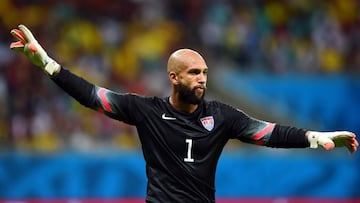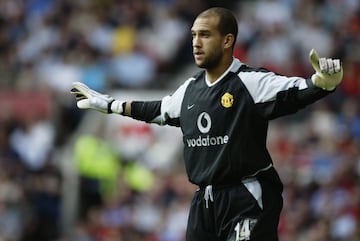The iconic goalkeeper spoke to AS USA about the future of American soccer ahead of his induction to the US Soccer Hall of Fame.
William GittinsWillGittUpdate: Apr 19th, 2024 13:18 EDT0

Getty Images
Tim Howard saw a lot over the course of his 24-year professional career. The New Jersey-born goalkeeper made his debut in the infancy of MLS and went on to join Premier League champions Manchester United, to spend a decade with Everton and to win an astonishing 121 international caps.
His career spanned a period of profound change for soccer in the United States as the game grew from niche interest to mainstream pastime. The MLS in which he made his debut for the MetroStars – now the New York Red Bulls – was a 12-team league with a dwindling audience. By the time he returned to play for Colorado Rapids at the other end of his storied career, MLS had doubled in size and young American talents were making the move to Europe at an ever-increasing rate.
Next month Tim Howard will officially be inducted in the US Soccer Hall of Fame. Ahead of his induction ceremony he spoke to AS USA about his own journey and the progression of soccer in the United States.
Thrown in at the deep end
Howard’s professional career began with the North Jersey Imperials before being swiftly moved up to represent the MetroStars in MLS. As the 19-year-old goalkeeper readied himself for his debut against the Colorado Rapids, MetroStars midfielder Tab Ramos had some words of wisdom, ones that would prove prescient for the young debutant: “This is not the most important game you’re going to play.”
Ramos was right. The following seasons brought two appearances in the MLS Best XI, the 2001 MLS Goalkeeper of the Year award and a dream move to Europe. Manchester United, the reigning Premier League champions, needed a new goalkeeper and decided that the young American was ready to make the leap, bringing him to the very top of the European game.

Tim Howard spent three seasons with Manchester United, lifting the FA Cup, League Cup and Community Shield.Getty Images
Howard recalls: “It was hard as hell. Sometimes you have to be careful what you wish for. I wanted to be great, to be a professional and I was able to do that for five and a half seasons in MLS and then I wanted to go to Europe.”
“Ideally I would have probably gone to a smaller league and pd out how to be a goalkeeper. But I didn’t, I went to Manchester United. It was scary and it was daunting but it was amazing nonetheless and it set me off on a path that was nothing short of monumental.”
After spending three years with United the arrival of legendary Dutch goalkeeper Edwin van der Sar saw Howard’s playing time severely reduced. Then aged 27, he decided to make the switch to fellow Premier League side Everton, a move he now describes as “the best decision of my life.” Howard would go on to spend a decade on Merseyside, racking up more than 400 appearances for one of England’s most storied clubs. A true success story for American soccer and a blueprint for young players breaking through in MLS.
US stars follow in Howard’s footsteps
Tim Howard made his international debut in March 2002 but that summer’s World Cup was deemed to be a little too early for the promising young goalkeeper. His chance would come in 2006 when he was called-up to represent his nation in Germany, the first of three World Cups that he would attend. The then-Manchester United goalkeeper was one of just eight players in the 23-man US squad playing in a top-flight European league.
Flash forward to 2024 and the picture looks very different. The most recent USMNT roster featured 19 Europe-based players, an indicator of the development of US soccer. The current squad has representation from the likes of AC Milan, Juventus and soon-to-be Dutch champions PSV Eindhoven. When USMNT beat Mexico in the CONCACAF Nations League final earlier this year, all of 16 players used by Gregg Berhalter were based in Europe. US soccer is producing these elite talents with greater regularity and, just as importantly, top clubs are becoming increasingly convinced of their value.
For Howard, it’s a trend that hints at the future for US soccer: “Why are we seeing more of it? I think the world has cast its eyes on America and American talent and understands how good some of our young players are. So when you look at MLS and the players that they are bringing through, some of them they’re able to keep but some of them they aren’t.”

This generation of USMNT stars are all playing for top European clubs.EDUARDO MUNOZAFP
“The soil is rich here”
In 2021 legendary French manager Arsene Wenger was asked about the prospects for American soccer going forward. Wenger, who now holds a key developmental role within global governing body FIFA, said that he has high hopes for the national team at the 2026 World Cup. The former Arsenal boss cited “a good dozen who play in big clubs.”
Historically the migration of US players to Europe has been steady, with only the most promising members of each generation making it to the world’s most-celebrated leagues. In recent years that trickle has become a stream, a constant flow of highly-rated players signing for top European teams. Few would argue against the benefits for the US national team, with players getting more experience playing for bigger clubs in higher-quality competitions.
But what does it mean for MLS? Does the scale of the exodus hint at a weakness in America’s own top flight, an inability to maintain the interest of it’s top players? Howard makes a robust case for the opposite. The 45-year-old, now sporting director of US Championship club Memphis 901, is bullish about US soccer’s prospects.
“Outside of probably three countries, most of the world’s best players get exported. Sometimes I talk to people about MLS and it gets a bad rap. They ask, ‘Why can’t MLS keep their players?’ I always say, ‘I don’t know, why can’t Holland keep their players? Why can’t Italy?’ It’s just the way the world works when you produce talent. The eyes of the world are on MLS and, frankly, the soil is rich here. It’s good to see them go over.”

